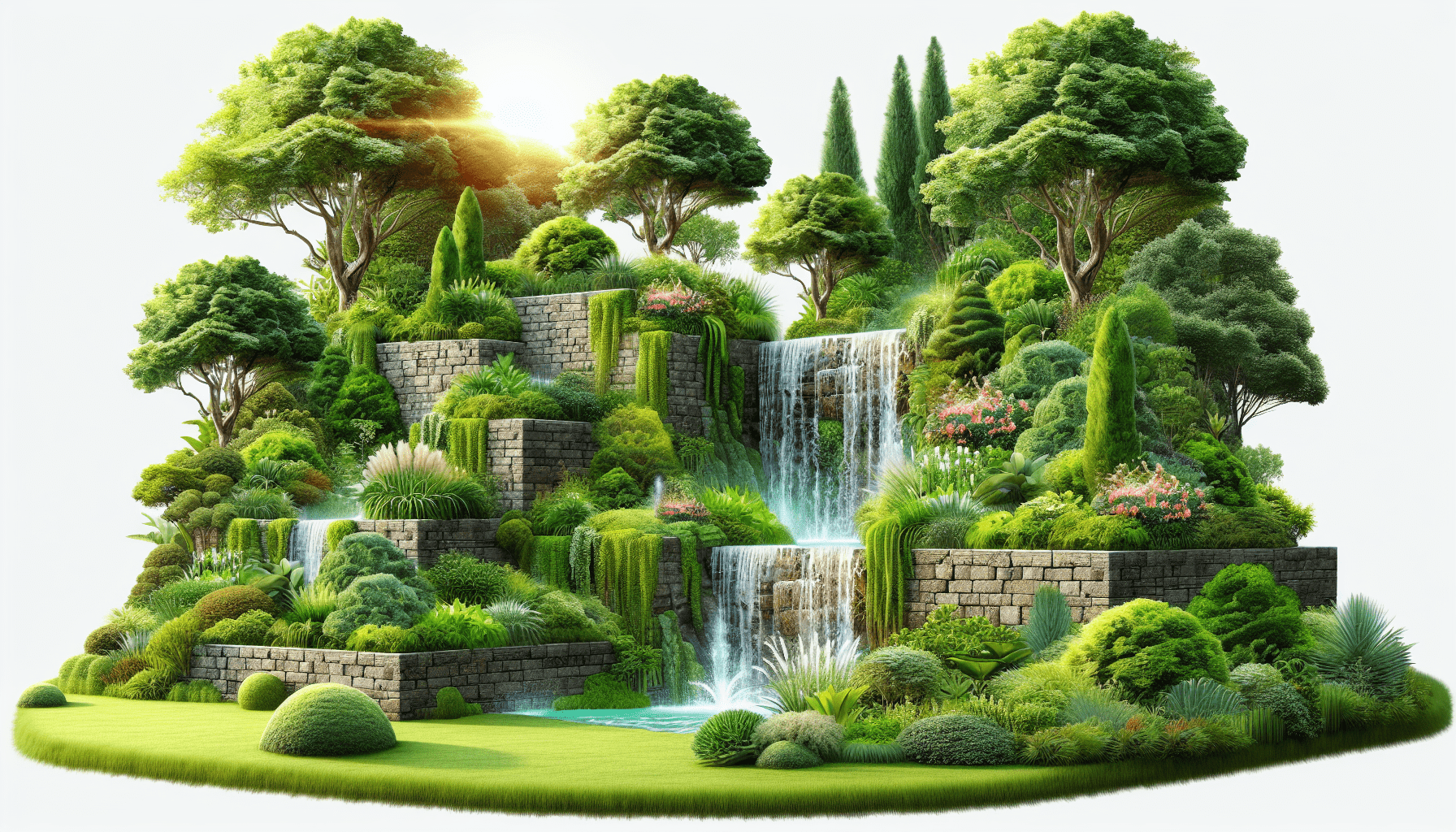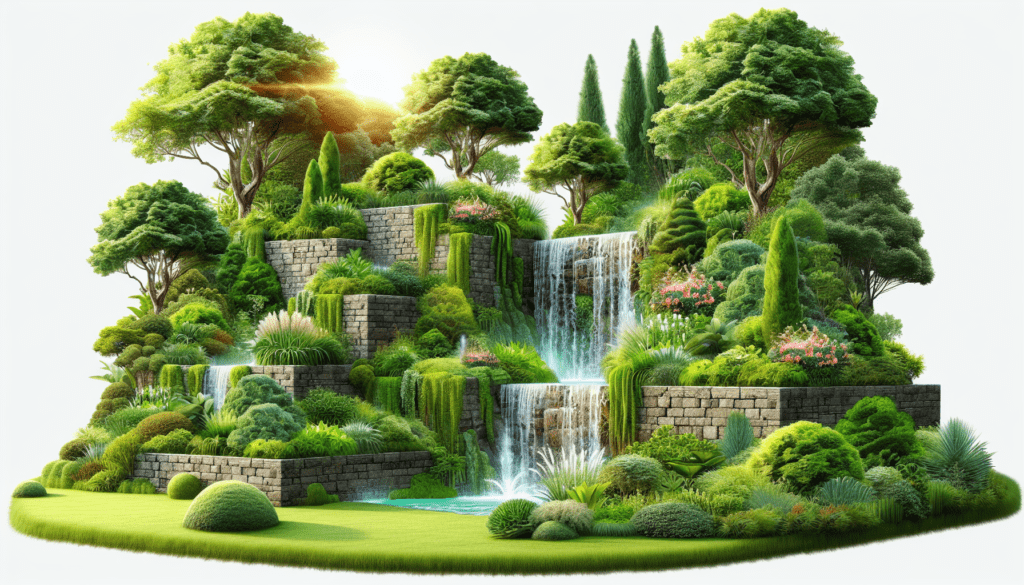
When it comes to choosing materials for your retaining wall, durability, and aesthetic appeal are crucial aspects to consider among the wide range of wall material options available. Natural stone, such as granite, limestone, or sandstone, combines timeless elegance with outstanding strength, making it a popular choice.
It can withstand the test of time and various weather conditions, ensuring the longevity and functionality of your wall.
Concrete, on the other hand, offers versatility and customization options.
You can texture or color concrete walls to match your landscape, providing both stability and visual appeal.
For those who prioritize sustainability, timber is an eco-friendly option that seamlessly blends with outdoor settings.
Although timber requires more maintenance, proper treatment, and sealing can significantly extend its lifespan. To explore the best and most affordable options for your retaining wall, consider the wide range of wall material choices available.
Click here for more information: Rockwell-construction.com
Different Types of Wall Materials for Retaining Walls
When it comes to selecting the right materials for your retaining wall selection, it is important to consider not only durability and aesthetic appeal but also the specific needs of your project, such as the wall stone types or retaining wall alternatives. One of the popular alternatives to traditional stone or concrete walls is interlocking concrete blocks.
These blocks provide a simple and efficient way to build a retaining wall, offering both stability and ease of installation.
Another option to consider is gabion walls, which are constructed using wire baskets filled with stones or other materials.
This unique design not only adds a touch of eco-friendliness but also creates a visually striking effect. There are various wall material brands and models available that offer different stone choices, providing you with the flexibility to achieve your desired look for your retaining wall and choose from a wide range of wall stone options.
Choosing the Best Wall Material for Your Retaining Wall Project
When it comes to choosing the best material for your retaining wall project, there are several important factors to consider, such as the retaining wall stone varieties, alternatives, and options available. First, you need to think about the structural stability of the wall and how it will enhance the overall look of your landscape.
It’s also crucial to take into account the type of soil in your area, as this will affect the drainage properties and determine which materials are suitable for proper water management.
The height and slope of your retaining wall are also key considerations when selecting the right material.
It’s important to choose a material that is durable and can withstand the weather conditions in your area, as the wall will be exposed to the elements over time. Popular options for retaining wall materials include concrete, stone, brick, and retaining wall stone varieties.
| Retaining Wall Material | Structural Stability | Drainage Properties | Durability |
|---|---|---|---|
| Concrete | High | Good | Excellent |
| Stone | Medium to High | Varies | Varies |
| Brick | Medium | Fair | Good |
| Retaining Wall Stone Varieties | Varies | Varies | Varies |
Factors to Consider in Selecting Wall Materials for Your Retaining Wall
When it comes to selecting materials for your retaining wall, it is important to consider the cost of various retaining wall brick options. The price of the materials can vary greatly, so it is essential to establish a budget and stick to it.
It is important to note that while some materials may be more expensive upfront, they may offer long-term benefits in terms of durability and maintenance.
There are also affordable alternatives available that can still provide sufficient strength and stability for your retaining wall.
The key is to find the right balance between cost and quality when making your selection.
Pros and Cons of Wall Material Options for Retaining Walls
When it comes to selecting the ideal material for your retaining wall, it’s essential to consider the pros and cons of each option, including the various retaining wall concrete choices available. One popular choice is concrete, known for its durability and strength, making it resistant to rot, pests, and fire.
Concrete walls can be costly to install and require professional assistance due to their weight and complexity.
Another option to consider is wood, which offers a natural and aesthetically pleasing appearance.
Wood retaining walls are easily constructed and can be customized to complement any landscape design. Wood is generally more cost-effective.
Wood is susceptible to rot, pests, and weather damage, which may require regular maintenance and eventual replacement.
For those who prioritize environmental sustainability, recycled materials like plastic or composite lumber can be a viable option.
These materials are not only eco-friendly but also offer durability and strength for retaining walls. Consider getting a free quote from Rockwell Construction, known for its affordability and expertise in retaining wall concrete selection.
Retaining Wall Materials
- Concrete walls are known for their durability and strength, making them resistant to rot, pests, and fire.
- Wood retaining walls offer a natural and aesthetically pleasing appearance and can be customized to complement any landscape design.
- Recycled materials like plastic or composite lumber are eco-friendly options for retaining walls and provide durability and strength.
- Rockwell Construction is a reputable company known for its affordability and expertise in retaining wall concrete selection.
Exploring the Variety of Wall Materials for Retaining Walls
When it comes to exploring the variety of wall materials for retaining walls, there are several options to consider beyond concrete and wood, such as retaining wall concrete alternatives and wall wood varieties. One alternative to traditional materials is gabion walls.
Gabions are wire mesh baskets filled with rocks or other materials, and they offer a unique and natural look that blends seamlessly into the landscape.
Gabion walls are known for their strength and durability, making them an excellent choice for retaining walls.
They are also highly permeable, allowing water to pass through and reducing hydrostatic pressure.
Another option to consider is interlocking concrete blocks. These precast blocks are designed to fit together like puzzle pieces, providing a quick and easy installation process for retaining wall concrete alternatives.
Key Factors to Keep in Mind When Deciding on Wall Materials for Your Retaining Wall
When it comes to deciding on wall materials for your retaining wall, there are several key factors to consider, including the selection of wall block types and varieties. Firstly, you need to take into account the type of soil in your area and its specific properties, as different soil types have varying drainage capabilities and erosion tendencies.
This will help you choose materials that are appropriate for the soil conditions.
The height and length of your wall are important considerations.
Taller or longer walls require stronger materials to withstand the pressure exerted by the soil. The location of your retaining wall, such as whether it’s built on a slope or near a water source, can also impact material selection.
Durability is another crucial factor, as retaining walls are exposed to various weather conditions. Opt for materials that are resistant to rain, snow, and temperature fluctuations to ensure longevity.
Aesthetics can also come into play when choosing materials for your retaining wall.
| Factors to Consider | Relevant Data Points |
|---|---|
| Type of Soil | Different soil types have varying drainage capabilities and erosion tendencies. |
| Height and Length of Wall | Taller or longer walls require stronger materials to withstand soil pressure. |
| Location of Wall | The wall’s position on a slope or near a water source can impact material selection. |
| Durability | Choose materials resistant to rain, snow, and temperature fluctuations for longevity. |
| Aesthetics | Consider the visual appeal when choosing materials for your retaining wall. |
Alternatives to Traditional Wall Materials for Retaining Walls
When it comes to retaining wall block options, there are a variety of alternatives to traditional materials that can offer unique benefits, such as different retaining wall block types or wall gravel choices. One option to consider is the use of concrete blocks.
Concrete retaining wall blocks are available in various sizes and shapes, allowing for versatile and customizable designs.
These blocks are strong, durable, and resistant to weathering, making them an excellent choice for long-lasting retaining walls.
Concrete blocks can be easily installed and provide excellent stability and support to prevent soil erosion.
Another alternative to consider is the use of natural stone retaining wall blocks. Natural stone blocks offer a timeless and elegant aesthetic, making them the perfect choice for creating a stunning retaining wall that complements any design.
Importance of Selecting the Right Wall Material for a Long-Lasting Retaining Wall
When it comes to building a long-lasting retaining wall, it is essential to carefully choose the right wall material, such as retaining wall gravel types or wall rock options. Several factors should be considered, including strength, stability, environmental resistance, and aesthetic appeal.
The ease of installation and maintenance should be taken into account.
Luckily, there is a wide range of options available to meet these criteria.
One can consider various choices of wall rock and gravel for retaining walls. By selecting the appropriate material, you can ensure that your retaining wall will be durable, visually appealing, and capable of standing the test of time.
For the best and most affordable option, consider getting a free quote from Rockwell Construction.
Retaining Walls
- Retaining wall gravel types and wall rock options provide strength and stability to the structure.
- Choosing the right material for retaining walls ensures environmental resistance and longevity.
- Retaining walls with aesthetic appeal enhance the overall appearance of the landscape.
- Easy installation and maintenance make retaining walls a convenient choice for property owners.
